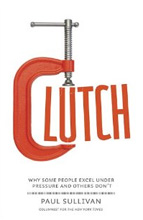
The past twelve months have been a year to forget for Tiger Woods. The once proud face of golf has devolved into a scattered identity with more questions than answers.
Now Woods is featured in a new book about success under pressure entitled Clutch: Why Some People Excel Under Pressure and OtherS Don’t by Paul Sullivan. The author details the skills that help top performers like Tiger pre Thanksgiving 2009 thrive over stress – at least on the golf course.
As Sullivan defines it, being “clutch” is having “the fortitude to continue battling … even though the whole world is wondering whether you’re going to choke.” But choking — failing to deliver results when it counts most — isn’t solely a product of pressure, just as being clutch is never about luck. And there is no quick, new-age answer to instantly transform someone who chokes under the weight of expectations into a star performer. That’s because while focus and adaptability are two key components to being clutch, what every scenario Sullivan highlights has in common is attentive, interminable preparation. Nothing can replace the time spent honing a craft — it’s what positions a person for success in the critical moments.
But while developing the skills required to be clutch takes serious mental and physical discipline, the antidote to choking is seemingly simple: take responsibility for your actions and the events that transpire from them. If you’re connected to the choices you make, it will help correct your decision-making process before small problems grow unwieldy. Sullivan advises that over-thinking actions and being overconfident are also contributors to catastrophic failure, but the foundation of a choke is most often in the refusal to fully accept the weight of a bad call. This is true, too, in the boardroom, about which Sullivan writes, “The unwillingness to take blame for bad decisions and tolerate criticism for tough ones is a telltale sign of a bad leader under any condition.”
Click here for the full article.

